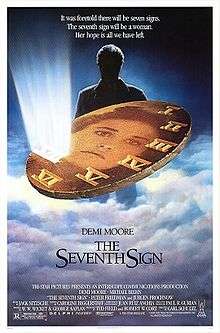The Seventh Sign
| The Seventh Sign | |
|---|---|
 | |
| Directed by | Carl Schultz |
| Produced by |
Ted Field Robert W. Cort |
| Written by |
Clifford Green Ellen Green |
| Starring | |
| Music by | Jack Nitzsche |
| Cinematography | Juan Ruiz Anchia |
| Edited by | Caroline Biggerstaff |
Production company | |
| Distributed by | TriStar Pictures |
Release dates |
|
Running time | 97 minutes |
| Country | United States |
| Language | English |
| Box office | $18,875,011 |
The Seventh Sign is a 1988 apocalyptic drama film written by Clifford and Ellen Green and directed by Carl Schultz. The title and plot reference the seven seals described in the Book of Revelation, the final book of the New Testament of the Bible.[1]
Plot
Signs of the apocalypse are appearing, along with Father Lucci. Lucci is the Vatican official investigating the signs. He dismisses the occurrences as natural, convincing the Vatican that they are not worthy of attention.
Abby and Russell Quinn are a young married couple expecting the birth of their first child. They rent the small, sparse, room above their garage to David Bannon. David is actually the Second Coming of Jesus, who has returned to Earth to judge humanity.
Through a flashback, Bannon/Jesus is seen on the eve of his original crucifixion. Father Lucci is revealed to be Cartaphilus, a Roman Centurion and Pilate's porter who struck Jesus before his death and was sentenced to wander the Earth until Christ returns to judge mankind. (A combination of the Longinus and the Wandering Jew legends.)
Abby snoops through David's papers, finding an ancient note that makes her believe that he intends to harm her unborn child. She confronts David, who tells her that God's grace is empty and He will no longer give souls to newborns – starting with her baby. Abby panics and stabs him, only to learn that he "can't die again". He later tells her that God will grant the world a second chance if one of the signs of the apocalypse can be stopped.
Father Lucci finds Abby. She has started to have visions of the original death of Christ, and soon realizes who Lucci really is and that he wants the world to end so that his curse can end. Abby's visions show that she is actually the reborn woman some identify as Seraphia, who offered Christ water during the Crucifixion but was turned away by Cartaphilus.
God's judgment is averted by an act of faith that prevents the final sign of the apocalypse from occurring, giving her soul to her seconds-old newborn, repeating "I will die for him." David appears in the delivery room, telling Russell that Abby's sacrifice has filled the Hall of Souls again.
Cast
- Demi Moore as Abby Quinn
- Michael Biehn as Russell Quinn
- Jürgen Prochnow as David Bannon
- Peter Friedman as Father Lucci
Release and reception
The film was released theatrically in the United States by TriStar Pictures in April 1988. It grossed $18,875,011 at the box office.[2] It received negative reviews from critics, and holds a 19% rating on Rotten Tomatoes based on 16 reviews.
The film was released on DVD in the United States by Sony Pictures Home Entertainment in 1998.[3]
See also
References
- ↑ CANBY3, VINCENT (April 1, 1988). "The Seventh Sign (1988) Review/Film; The World in Very Big Trouble". The New York Times Company. Retrieved 2012-09-26.
- ↑ "The Seventh Sign". boxofficemojo.com. Retrieved 2011-04-13.
- ↑ "The Seventh Sign (DVD)". dvdempire.com. Retrieved 2011-04-13.
External links
- The Seventh Sign at the Internet Movie Database
- The Seventh Sign at Rotten Tomatoes
- The Seventh Sign Review by Roger Ebert